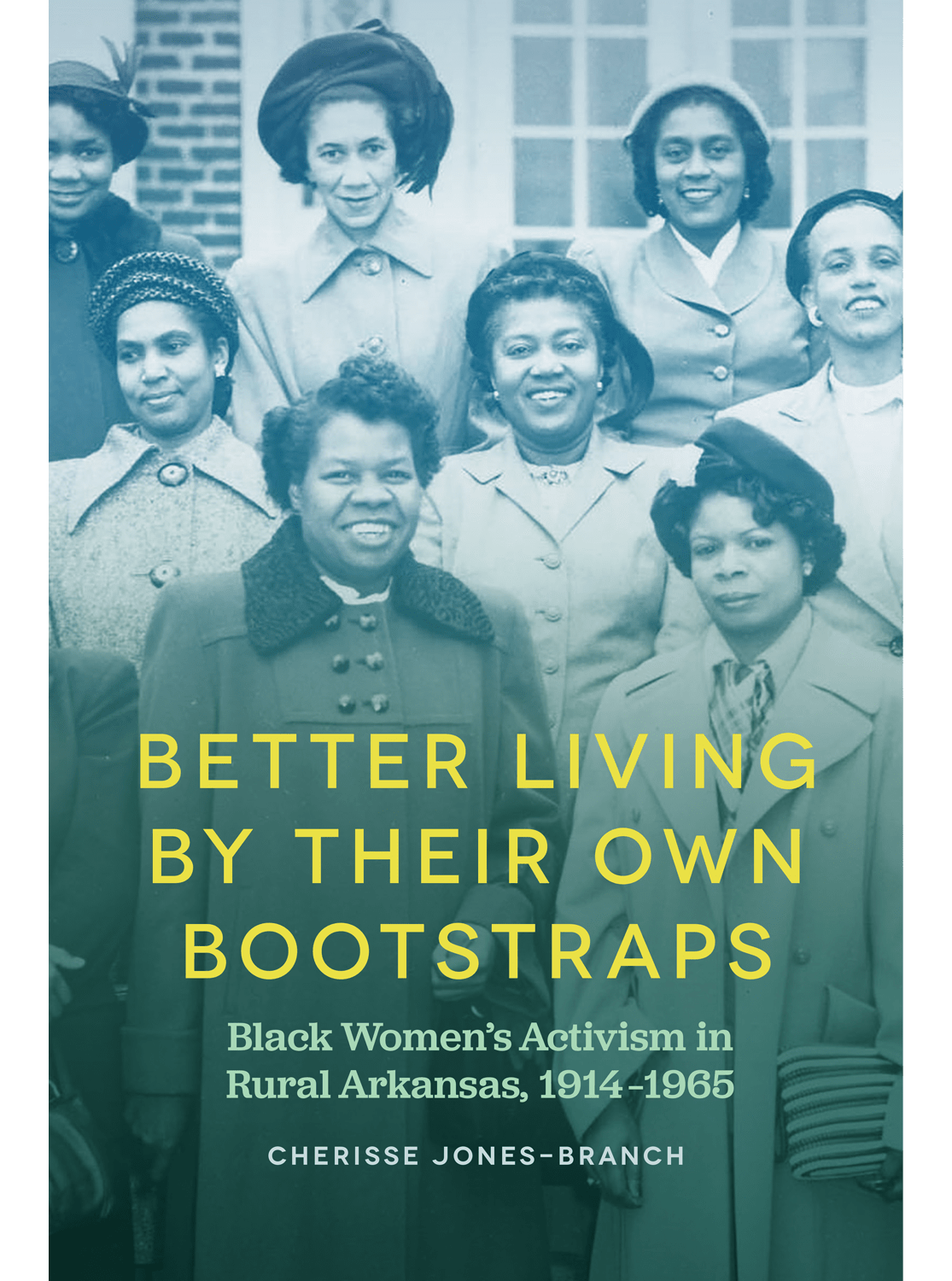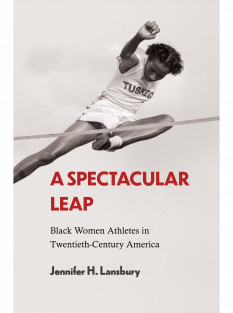The first major study to consider Black women’s activism in rural Arkansas, Better Living by Their Own Bootstraps foregrounds activists’ quest to improve Black communities through language and foodways as well as politics and community organizing. In reexamining these efforts, Cherisse Jones-Branch lifts many important figures out of obscurity, positioning them squarely within Arkansas’s agrarian history.
The Black women activists highlighted here include home demonstration agents employed by the Arkansas Agricultural Cooperative Extension Service and Jeanes Supervising Industrial Teachers, all of whom possessed an acute understanding of the difficulties that African Americans faced in rural spaces. Examining these activists through a historical lens, Jones-Branch reveals how educated, middle-class Black women worked with their less-educated rural sisters to create all-female spaces where they confronted economic, educational, public health, political, and theological concerns free from white regulation and interference.
Centered on the period between 1914 and 1965, Better Living by Their Own Bootstraps brings long-overdue attention to an important chapter in Arkansas history, spotlighting a group of Black women activists who uplifted their communities while subverting the formidable structures of white supremacy.

Cherisse Jones-Branch is the James and Wanda Lee Vaughn Endowed Professor of History at Arkansas State University, where she is dean of the graduate school. She is the author of Crossing the Line: Women and Interracial Activism in South Carolina during and after World War II and the coeditor of Arkansas Women: Their Lives and Times.
“In Better Living by Their Own Bootstraps, Cherisse Jones-Branch reshapes the landscape of scholarship on rural women and education reform. She skillfully balances organizational and individual histories to trace patterns of rural Black activism across time…. Jones-Branch not only breaks the ‘silences surrounding Black women’s labor and leadership’ but she also challenges scholars to rethink the relationship between reformers and those they served, the work of leaders and organizations in building leadership capacity in rural communities, and the meaning of cooperation, collaboration, and mutualism for rural lives within and against white supremacist structures.”
—Mary S. Hoffschwelle, Journal of American History, December 2022
“In twelve swift chapters, Jones-Branch tells the story of how black Arkansas women created networks to mitigate the symptoms of southern rural poverty and, as they could, to struggle against its roots. … The impression that a reader comes away with after reading Better Living by Their Own Bootstraps is one of constant motion and persistence. The women in the book faced dreadful circumstances and poor odds for success. But they worked and they tried and Cherisse Jones-Branch has ensured that the world knows about their efforts. We are grateful for her reminding us about their obstacles and teaching us about their labors.”
—Rebecca Sharpless, Arkansas Historical Quarterly, Autumn 2021
“In Better Living by Their Own Bootstraps: Black Women’s Activism in Rural Arkansas, 1914-1965, Cherisse Jones-Branch examines Black women’s activism in the rural South. Focusing specifically on rural Arkansas, she shows how women created safe spaces to tackle the most significant problems within their communities, related to health, education, and the family. Comprising largely chronological chapters, spanning the years 1914 to 1965, this work moves the scholarship of rural life in Arkansas forward by looking beyond the perspective of white men to see what forms of activism and institutions Black women used. It is an important addition to our historical understanding of rural, southern Black women. … Better Living by Their Own Bootstraps is a strong addition to the historiography. The book will appeal to multiple audiences, including Arkansas natives and residents, and those interested in the state’s history. While this type of case study will certainly be popular among these local audiences, the book will also appeal to those interested in diverse topics, including the study of rural Black women during the twentieth century, rural history, and the politicization of women in the years before the civil rights movement.”
—Lindsey Bestebreurtje, H-Net Reviews
“In Better Living by Their Own Bootstraps, Cherisse Jones-Branch offers a ground-breaking, comprehensive study of African American women who worked on behalf of their rural Arkansas communities through the cooperative extension service, educational institutions, and other organizations. By centering Black women’s transformative leadership within the contexts of segregation, global war, racial violence, natural disasters, and the civil rights movement, Jones-Branch brings the voices of rural Black women into larger conversations about the significance of life and labor in the countryside. Painstakingly researched, her thoughtful cultivation of historical records brings to life the Black women who worked in Arkansas as extension agents, farmers, educators, and activists during a period of tremendous transformation.”
—Jenny Barker-Devine, author of On Behalf of the Family Farm: Iowa Farm Women’s Activism Since 1945
“American rural history needs more women’s history. And rural women’s history needs more Black history. Cherisse Jones-Branch addresses these needs by writing about Black women in Arkansas who had been rendered invisible by previous scholarship. Beginning with a profound respect for Black women leaders, Jones-Branch brings her skillful archival research and her enthusiastic storytelling to the task of setting the historical record straight. Better Living by Their Own Bootstraps makes a major contribution to Arkansas history and American rural history.”
—Linda M. Ambrose, author of A Great Rural Sisterhood: Madge Robertson Watt and the ACWW
“In impressive detail and lovely, engaging prose, Cherisse Jones-Branch argues that African American women who remained in Arkansas during the years of widespread migration remade the countryside through their struggle to improve their communities’ access to health care, food, political representation, and economic opportunity. With this book, Jones-Branch has established herself as a leading historian not only of rural Black women’s twentieth-century activism but also of American rural history overall.”
—Adrienne Monteith Petty, author of Standing Their Ground: Small Farmers in North Carolina since the Civil War
Introduction
1. Arkansas Jeanes Supervising Industrial Teachers
2. Home Demonstration Agents in Rural Black Arkansas Communities
3. African American Women’s Activism in Rural Black Communities during and following World War I
4. The Mississippi River Flood of 1927 and Agrarian Activism in 1930s Arkansas
5. The State Council of Home Demonstration Clubs
6. The Arkansas Association of Colored Women
7. World War II
8. The Arkansas Farm Bureau Federation Negro Division and the Spirit of Cotton Pageant
9. Rural Activism in 1950s Arkansas
10. Ethel B. Dawson and the National Council of Churches of Christ Home Missions Division
11. The National Negro Home Demonstration Agents’ Association
12. Annie Zachary Pike: Arkansas Homemaker, Farmer, and Politician
Conclusion
Notes
Bibliography
Index

Adopted at: University of Arkansas
Course: HIST 3243 and AAST 3243 African American History Since 1877
Course Description: The course will study the major social, political, and economical issues relating to the African American experience beginning with the late post-Reconstruction period and will include all of the major personalities and influences in the Civil Rights Movement, from 1877 to the present.
Professor: Ryan Smith
Term: Spring 2023







